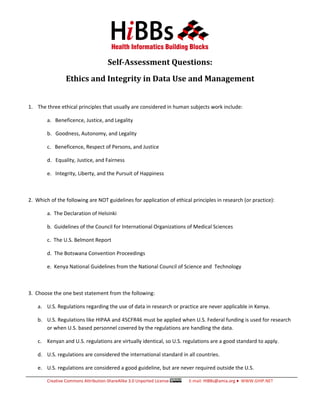
Ethics and Integrity in Data Use and Management Self-Assessment Questions
- 1. Self-Assessment Questions: Ethics and Integrity in Data Use and Management 1. The three ethical principles that usually are considered in human subjects work include: a. Beneficence, Justice, and Legality b. Goodness, Autonomy, and Legality c. Beneficence, Respect of Persons, and Justice d. Equality, Justice, and Fairness e. Integrity, Liberty, and the Pursuit of Happiness 2. Which of the following are NOT guidelines for application of ethical principles in research (or practice): a. The Declaration of Helsinki b. Guidelines of the Council for International Organizations of Medical Sciences c. The U.S. Belmont Report d. The Botswana Convention Proceedings e. Kenya National Guidelines from the National Council of Science and Technology 3. Choose the one best statement from the following: a. U.S. Regulations regarding the use of data in research or practice are never applicable in Kenya. b. U.S. Regulations like HIPAA and 45CFR46 must be applied when U.S. Federal funding is used for research or when U.S. based personnel covered by the regulations are handling the data. c. Kenyan and U.S. regulations are virtually identical, so U.S. regulations are a good standard to apply. d. U.S. regulations are considered the international standard in all countries. e. U.S. regulations are considered a good guideline, but are never required outside the U.S. Creative Commons Attribution-ShareAlike 3.0 Unported License E-mail: HIBBs@amia.org ♦ WWW.GHIP.NET
- 2. Self-Assessment Questions: Ethics and Integrity in Data Use and Management 2 4. Privacy of patient records: a. Is only a concern in research—not for hospital patient records. b. Is not a major concern when handling electronic records because those records are always password protected. c. Is the responsibility of everyone who collects, handles or stores data. d. Is only important when there are specific laws governing patient confidentiality. e. Is an important application of the ethical principle of Confidentiality. 5. With regard to Data integrity, which of the following is FALSE: a. Data integrity is an ongoing process to ensure that data are complete, accurate, and valid. b. Data integrity involves proper collection, handling, storage, sharing and use of data. c. Fabrication and Falsification of data are rare, and therefore are of minor concern in data integrity for research. d. Everyone on the patient care or research team has a responsibility to safeguard integrity of the data. e. The design of a study should include a sampling plan and data analysis plan that will help to maintain data integrity. 6. Which of the following is NOT part of ensuring data security: a. Locking rooms or cabinets that contain patient data. b. Restricting privileges on electronic records so that only appropriate personnel can view data. c. Password protecting computer files. d. Performing background checks on all data personnel to screen out anyone with a criminal record. e. Doing regular backups and archiving of data to prevent data loss. Creative Commons Attribution-ShareAlike 3.0 Unported License E-mail: HIBBs@amia.org ♦ WWW.GHIP.NET
- 3. Self-Assessment Questions: Ethics and Integrity in Data Use and Management 3 7. Regarding ethics in publication of data, which of the following is FALSE: a. Appropriate creation of datasets and analysis of data are important. b. Improper analysis is always ethical misconduct. c. Fabrication of data is always ethical misconduct. d. IRB approval is needed when handling data from human subjects, human tissues, or medical records. e. Research should be designed to answer specific questions, and choosing an appropriate sample size is an important part of ethical design of data analysis. 8. Which of the following are ALL considered Protected Health Information (PHI) under the U.S. HIPAA regulations: a. Name, phone number, National ID number, birthdate. b. Name, phone number, province, national ID number. c. Name, phone number, age in years, national ID number. d. Name, phone number, age in months, national ID number. e. Name, phone number, village, country of citizenship. 9. When translating ethical principles into practice: a. The use of electronic records to improve quality of safety of medical care relates to the principle of Justice. b. Use of records without the patient’s consent or knowledge is not a breach of Respect of Persons (Autonomy) if the data is used to improve care. c. Exclusion of certain representative populations from a record or database rarely affects conclusions from the data, so it is not important for ethical determinations. d. Loss of Privacy of information is related to the ethical principle of Confidentiality e. Ethical principles should be applied to both clinical and research uses of data. Creative Commons Attribution-ShareAlike 3.0 Unported License E-mail: HIBBs@amia.org ♦ WWW.GHIP.NET
- 4. Self-Assessment Questions: Ethics and Integrity in Data Use and Management 4 10. Which of the following statements is FALSE: a. There are multiple definitions for data integrity, but all include the idea that data should be accurate and complete. b. The ethical principal of Beneficence relates to the idea that we should always try to minimize harm and maximize benefits to patients or research participants. c. While there are national and international guidelines that govern ethical use of human subjects data, these are only important for research and have little or no application to clinical data use. d. Proper data security involves protecting data from unauthorized use and disclosure, as well as implementing procedures to guard against loss of data. e. The length of time that data must be stored may differ, depending upon the policies of the institution, the funder, and the law. Creative Commons Attribution-ShareAlike 3.0 Unported License E-mail: HIBBs@amia.org ♦ WWW.GHIP.NET
- 5. Self-Assessment Questions: Ethics and Integrity in Data Use and Management 5 ANSWER KEY: 1. C 2. D 3. B 4. C 5. C 6. D 7. B 8. A 9. E 10. C Creative Commons Attribution-ShareAlike 3.0 Unported License E-mail: HIBBs@amia.org ♦ WWW.GHIP.NET
